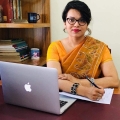Meet My Country: Bangladesh, With Sara Hossain and Dr. Faraha Nawaz
Season 2, Episode 4
Supreme Court lawyer Sara Hossain and academic Dr. Faraha Nawaz talk about their homeland Bangladesh – one of the world’s most crowded countries. Bangladesh has been going through remarkable developments since the 1990s. Millions have been pulled out of poverty, the garment industry has flourished, and before the pandemic, economic growth exceeded 7% for four years in a row, outpacing not just Pakistan and India, but even China. This development is, however, contrasted with a complicated political and human rights situation and an erosion of democratic institutions, as our speakers point out.
3:03 Background information on Bangladesh
5:38 Sara and Faraha’s views on Bangladesh, and where it stands today
11:10 The incredible development the country has undergone since the 1990s
15:02 About women in Bangladesh and some national politics, which also have been shaped mainly by women in recent years
29:38 Sara and Faraha’s recommendations on places to visit and food to try in Bangladesh
Your host: Denise Staubli, Program Manager, Asia Society Switzerland
Moderator: Nico Luchsinger, Executive Director, Asia Society Switzerland
Speakers:
Sara Hossain, Barrister at the Supreme Court of Bangladesh, Partner at the law firm of Dr. Kamal Hossain and Associates, pro bono Honorary Executive Director of the Bangladesh Legal Aid and Services Trust
Dr. Faraha Nawaz, Associate Professor at the University of Rajshahi, Bangladesh
Production: Denise Staubli
Show Notes
National Fish Hilsa
Roadside snacks, such as Singara
Cox's Bazar – the longest sea beach in the world
Hilly areas in the Rangamati and Bandarban districts
Bangladesh’s many and large rivers amongst the biggest in the world, such as the Brahmaputra
Leading newspapers in English, such as the Daily Prothom alo
The Colonel Who Would Not Repent, by Salil Tripathi about the Bangladeshi war
Books written by Shaheen Akhtar, who has won numerous awards for her fiction about Bangladesh's history and women's experience
Microfinance and Women’s Empowerment in Bangladesh, by Dr. Faraha Nawaz, 2019
Confronting Constitutional Curtailments: Attempts to Rebuild Independence of the Judiciary in Bangladesh by Sara Hossain, in Paul Brass (ed) Handbook of Politics in South Asia, Routledge, 2010
Rohingya Refugee Women and Girls: Remedies and Responses to Sexual and Gender based Violence in Bangladesh by Sara Hossain and Sajeda Amin, in Imtiaz Ahmed (ed) The Rohingya Refugee Crisis: Towards Sustainable Solutions, Dhaka, 2019
Asia Society Switzerland webcast A Closer Look at Bangladesh with Dr. Faraha Nawaz and Sara Hossain, June 17, 2021
Sara Hossain is a barrister practicing in the Supreme Court of Bangladesh, mainly in the areas of constitutional, public interest and family law. She is a partner at the law firm of Dr. Kamal Hossain and Associates, and serves pro bono as the Honorary Executive Director of the Bangladesh Legal Aid and Services Trust. Sara’s casework on women’s rights before the Supreme Court of Bangladesh has included among others, representing public interest petitioners, including BLAST, in writs challenging ‘fatwa’ violence (degrading punishments being imposed on women and girls accused of violating community norms on sexuality), ‘forced veiling’ and the use of the ‘two finger test’ as a form of medical evidence collection. Sara writes and speaks on public interest law, human rights and women’s rights and access to justice. Her publications include Confronting Constitutional Curtailments: Attempts to Rebuild Independence of the Judiciary in Bangladesh, in Paul Brass (ed) Handbook of Politics in South Asia (Routledge, 2010), Wayward Girls and Well-Wisher Parents: Habeas Corpus, Women’s Rights to Consent and the Bangladesh Courts in Aisha Gill (ed) Forced Marriage (Zed, London 2010); (with Bina de Costa) Redress for Sexual Violence Before the International Crimes Tribunal in Bangladesh: Lessons from History, and Hopes for the Future in Criminal Law Forum, Volume 21, Number 2, 331-359; (Co-edited with Lynn Welchman) Honour: Crimes, Paradigms and Violence against Women (Zed Books, London, 2005); (co-edited with Dina M. Siddiqi) Human Rights in Bangladesh 2007 (ASK, Dhaka, 2008); (with Sajeda Amin) Rohingya Refugee Women and Girls: Remedies and Responses to Sexual and Gender based Violence in Bangladesh in Imtiaz Ahmed (ed) The Rohingya Refugee Crisis: Towards Sustainable Solutions, (Dhaka 2019).

Dr. Faraha Nawaz is an Associate Professor at the University of Rajshahi, Bangladesh. Dr. Nawaz has proven her excellence both in basic and applied research as well as in publishing. As an academic, she has devoted herself in undertaking wide-ranging research in social sciences in general and gender issues in particular. She has published articles in refereed journals, chapters in edited books, and is the sole author of a book published from Palgrave Macmillan Microfinance and Women’s Empowerment in Bangladesh. Dr Nawaz is an active member of a number of international professional groups and networks such as NAPSIPAG, ISTR, EROPA, NZSAC, Dev Net and AWID, and has presented scholarly papers in various international conferences. She is a recipient of prestigious awards including gold medals, Charles Wallace award, Dev net Research award from New Zealand, Malaysian scholarly award, Australian Government scholarship, etc. She was an international fellow of Watson Institute for International and Public Affairs, Brown University, USA and a research fellow of Contemporary South Asian Studies program of School of Interdisciplinary area studies, University of OXFORD, UK.
